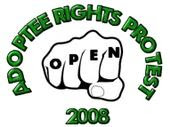 GRAND RAPIDS PRESS
GRAND RAPIDS PRESSMarch 17, 2008
Release of adoptee medical records could expose birth parents
Posted by Kyla King | The Grand Rapids Press March 17, 2008 07:51AM
ALLENDALE -- Until she was reunited with her birth mother three years ago, Karen Kemme never knew the hereditary disease cystic fibrosis ran in her biological family.
Even so, the Allendale Township mother of three has serious concerns about a proposed state law supporters say would help adult adoptees in her situation.
A bill that soon could be voted on in the House would allow some adult adoptees to get information about their biological family's medical history, and possibly copies of their original birth certificate.
The proposal is controversial because, as written, it could also allow access to the names of birth parents even if they wish to remain anonymous.
"I think there should be consideration on both sides because it's a very emotional thing -- my (biological) brothers and sisters didn't even know about me. (My biological mother) had to sit down with her family and say, 'Listen, I had a baby I released for adoption when I was 16,'" said Kemme -- who, it turns out, does not carry the trait that causes breathing and digestion problems.
Bill sponsor Rep. Lisa Wojno, D-Warren, says the legislation is aimed at helping adoptees learn if they are at higher risk for cancer, hereditary diseases or illnesses.
But the bill has raised concerns at Grand Rapids-based adoption assistance agency Bethany Christian Services because, as now written, it could allow access to birth certificates that previously could not be accessed without the consent of the biological parent.
Adoption advocates worry pregnant women will be discouraged from choosing adoption because of privacy concerns, said Bethany spokesman John VanValkenburg.
"In many cases those records have been sealed for decades," VanValkenburg said. "That confidentiality has been there for sometimes very valid reasons."
Michigan law allows some adopted individuals to get birth certificates once they become adults. But for those adopted between May 1945 and September 1980, a copy of the original birth certificate showing the names of biological parents is available only with a court order. Otherwise, the documents are sealed.
Adapting adoption
A look at legislation that would let adopted individuals get a copy of their birth certificate when they turn 21:
Why: To help adoptees get information about their biological family's medical history.
What is the concern: Birth certificates of children adopted between May 1945 and September 1980 previously have been accessible only with a court order. The proposed law could identify birth parents who may wish to remain anonymous.
Changes being considered: Lawmakers are considering revisions to protect privacy concerns.
State Rep. Fulton Sheen, R-Plainwell, opposed the bill when it passed out of committee saying it could violate confidentiality promises made to birth parents years ago. Sheen said the legislation is undergoing revisions he hopes will address privacy concerns before it comes for vote before the full House.
"I don't think we should be choosing whose rights are more important," Sheen said. "For those parents who don't want to be found, they ought to be able to give them the health information but have their names removed."
In Kemme's case, the 42-year-old used a confidential go-between at Bethany to make the initial contact with her birth mother, even though her birth mother had signed a form letting the state release her identity.
But even if her birth mother had not wanted to be identified, Kemme said she could have used the same confidential process to exchange medical history information.
"There was no law stopping me from doing that," Kemme said. "It would have happened the same way."
Bonnie Baker Harris, a post-adoption specialist at Bethany, said the agency regularly helps adult adoptees and their biological parents confidentially share medical histories about allergies, heart disease and other conditions.
"Birth moms are usually very relieved to find out that is an option for them to help that child access that information without having to jeopardize their need for confidentiality," Baker Harris said. "Usually, that's because the birth mother never shared with anybody the fact that she did have a child and released this child for adoption."
-- The Associated Press contributed to this story.
Link to article








1 comment:
But be warned adopting domestically might earn you a damaged older child. At least according to one commenter on this article Adopting domestically can lower hurdles to claiming tax credit.
---------
Dolly
Michigan Drug Addiction
Post a Comment